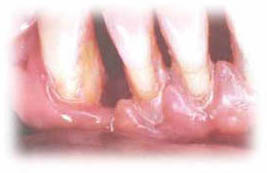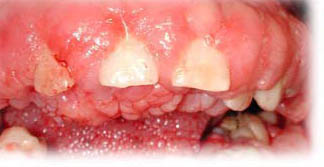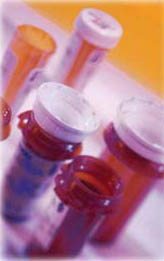Common Signs of Dental Disease and Dry Mouth
Signs of Dental Disease
If the older adult is not brushing or flossing, and there seems to be no physical limitation to prevent this, perhaps tooth decay or gum disease is present. If the individual is able to cognitively understand your questions, ask if they are having mouth pain. Some indications of tooth or gum pain can be:
 |
|
Picture of periodontal disease (courtesy of Case School of Dental Medicine) |
- Verbal complaints or visible expressions of pain
- Visible tooth decay
- Persistent bad breath
- Stained teeth
- Filmy or dull looking teeth
- Bleeding gums
- Swelling in the mouth
- Difficulty chewing
- Not eating
- Dentures are not in the mouth
- Dentures that don’t appear to fit
- Loose teeth
If the person has Alzheimer’s or another form of dementia, he or she may not be able to tell you that there is pain. Caregivers – wearing protective gloves and if necessary, a surgical mask – can carefully examine the individual’s mouth for some of the following signs:
- Visible tooth decay
- Filmy or dull looking teeth
- Bleeding gums
- Red or swollen gums
- Loose teeth
- Dry or cracked lips
- Mouth or tongue sores
- Dentures that don’t appear to fit
 |
|
Caregivers can check the mouth of an older adult for visible signs of bleeding, red or swollen gums – common indications that a dentist should be consulted.
(Photo courtesy of OSU Section of Periodontology) |
Dry Mouth
An older adult can experience problems with the teeth and gums (which can lead to or worsen tooth decay or gum disease) for many reasons.
Dry mouth – Constant or frequent dry mouth can be uncomfortable and can increase the chance of tooth decay and infections of the mouth. Over 400 common prescription and over-the-counter drugs are known to cause dry mouth. Sjogren Syndrome and some cancer therapies can also cause this.
Symptoms of dry mouth can be:
- mouth feels sticky and/or dry
- lack of saliva
- burning mouth
- saliva that feels thick or stringy
- tongue is rough and dry
- cracked lips and/or sores
- mouth infection
- difficulty chewing, swallowing or talking
- increased plaque
- bad breath
- loose dentures

Other tips are:
- Avoid caffeine.
- Avoid tobacco or alcohol.
- Drink plenty of water or sugar-free beverages.
- Suck on sugar-free candies or chew sugar-free gum.
Published with permission from Smiles For Seniors … an oral health initiative of the Ohio Dental Association.
For more information:
Go to the Dental and Oral Health (Seniors) health topic.